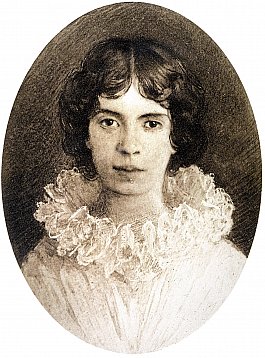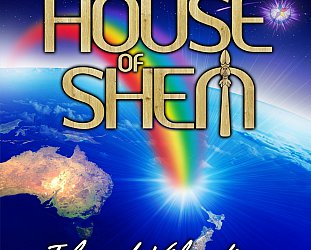Graham Reid | | 2 min read

At a time when local culture is increasingly self-obsessed and seduced by the idea of our exceptionalism, Matthew Bannister – swimming against the current tide – looks out the window rather than in the mirror.
His “lockdown album” as One Man Bannister, The Saddest Noise, isn't some morose bedroom pop born of isolation but rather an exploration of the works of American poet Emily Dickinson (1830-1886) . . . although admittedly she knew a thing or two about emotional separation. She chose it.
Dickinson rarely left her family home in Massachusetts and her preferred modes of communication were letters and poems, lots and lots of poems: more than 1500, although fewer than a dozen published in her lifetime.
For Bannister (Sneaky Feelings, Dribbling Darts of Love, the Weather, the Changing Same, One Man Bannister and releases under his own name) this is wonderful cache of material because of the pop economy of Dickinson's words which explore mortality, observations of humanity and the mystery of God.
 A typical Dickinson poem is Because I Could Not Stop for Death (“he kindly stopped for me”) in which the waif-like figure of Dickinson (who mostly wore white, like some ghostly nun) is lead towards the infinite in a carriage by courtly Death: “Since then – 'tis Centuries – and yet/Feels shorter than the Day/ I first surmised the Horse's Heads/Were towards Eternity”.
A typical Dickinson poem is Because I Could Not Stop for Death (“he kindly stopped for me”) in which the waif-like figure of Dickinson (who mostly wore white, like some ghostly nun) is lead towards the infinite in a carriage by courtly Death: “Since then – 'tis Centuries – and yet/Feels shorter than the Day/ I first surmised the Horse's Heads/Were towards Eternity”.
With just six stanzas of four lines apiece, the poem reads like the lyric of some dark Americana, but Bannister doesn't treat it as such. He delivers it as an acoustic folk song (which allows a focus on the words) and pulls a few words together to create a short chorus.
With discreet strings, the song has a mournful but not morose quality, and oddly enough some measure of hope in the destination of Eternity.
The simple A Bird, came down the Walk (almost a children's poem) gets a delightful folk-pop treatment with drums and a buzz of electric guitar.
Bannister – who delivered two fine albums of the Beatles' Rubber Soul and Revolver albums which reimagined the originals into different genres – brings a droning slightlydelic pop flavour to The Wind Tapped Like a Tired Man with piano, wah-wah and a minimalist rhythm, There's A Certain Slant of Light gets an airy folk treatment and A Narrow Fellow in the Grass has an Irish folk/nautical quality.
I Had Been Hungry All the Years comes off as whimsical Anglopop from 1965, Before I Got My Eye Put Out is quirky like an enjoyably undernourished Split Enz song and some might hear Syd Barrett in places here.
The sole Bannister original song here among the 16 pieces is Song For Emily (“what have you done to me?”), a slightly wistful chamber-pop love letter to his inspiration.
 Despite some of the themes in Dickinson's poetry, multi-instrumentalist Bannister and his small group bring a lightness of touch here.
Despite some of the themes in Dickinson's poetry, multi-instrumentalist Bannister and his small group bring a lightness of touch here.
And although poems rarely make for song lyrics, he shapes these into enjoyable pop and folk genre pieces across a collection which opens with the elegant Amherst instrumental and closes with the 19thcentury front parlour mood of the instrumental Stand Alone.
By it's subject matter and source material, The Saddest Noise will have a limited audience and that is a pity.
Like Emily Dickinson, Matthew Bannister looked out the window but in doing so sometimes saw his own reflection in the glass.
.
This album is available through Bandcamp here or Powertool Records here.
You can hear an interview with Matthew Bannister about Dickinson and this album on WTS Waikato radio here.





post a comment